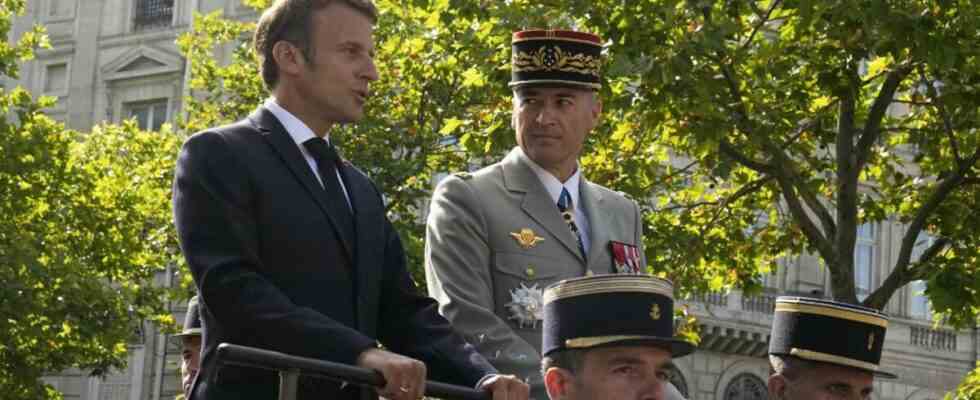It is said that travel shapes youth. According to Gérald Darmanin, the army would have the same virtues. Visiting Mayotte on Monday, the Minister of the Interior put forward the idea of ”places of re-education and recovery” for juvenile offenders, supervised by soldiers.
If the minister specified that the first of these “camps” could see the light of day on the archipelago of the Indian Ocean, overseas department and region, he also specified that he had already discussed it with the president. of the Republic, implying that the latter would be in favor of it, since the proposal was part of Emmanuel Macron’s promises during his candidacy for a second term last April.
A statement that surprised more than one on social networks, Internet users wondering where this statement can come from.
FAKE OFF
The Minister of the Interior is telling the truth. As discreet as it was, this proposal was indeed mentioned during Emmanuel Macron’s 2022 presidential campaign. If it generally passed under the radars of the oppositions and observers, the candidate “En Marche” had nevertheless announced it at least twice.
In his stage fright Emmanuel Macron, With you (still available online), the outgoing president laid out on page 20 his proposals on the subject of security. Among them, one could read: “For juvenile delinquents, the possibility of supervision by the military. Laconic, the idea does not mention camps and does not specify an age limit other than the absence of majority.
A vague and discreet proposal
At the time, the project was perhaps not quite defined since in web version of the campaign program available on the En Marche website, the military aspect disappears, giving way to “a closed educational center”.
It is during the second round debate between Emmanuel Macron and Marine Le Pen that the proposal was clarified in the words of the president. On the subject of minor offenders, the outgoing president then proposed “either detention in a military environment, or work of general interest under control. His rationale? “To put a light delinquent in a prison where he will associate with heavier delinquents is an absurdity. Since then, Emmanuel Macron has not commented on this subject.
The idea could have been whispered in his ear by his Minister of Justice. Indeed, a few months earlier, in October 2020, Eric Dupond-Moretti had declared to our colleagues at BFM TV that he was working with Florence Parly on “a partnership between the Ministry of Justice and that of the Armed Forces” for the supervision of “certain minors or young adults” delinquents.
A hobbyhorse of the right
Linking the rehabilitation of youth, and in particular of young offenders, to the army is not a new idea. Eric Ciotti, nostalgic for compulsory military service (even if he was exempted from it), had proposed in 2011 a path “between the street and prison” which aimed to send young offenders to Epide. Either centers supervised by soldiers and intended to help young people to reintegrate into employment, set up in 2005 by the government of Dominique de Villepin,
Problem, these centers were intended for young volunteers and not as a sanction for delinquency. The project had in any case been emptied of its substance by the new government of Jean-Marc Ayrault in 2012. The Republicans, Aurélien Pradié in the lead, had relaunched the debate in 2021 of a military framework to channel young offenders, justifying that the structures and the legal framework were already in place since the failed trial in 2011.
An unconvincing experience from 1986 to 2004
But the paternity of these initiatives probably goes to Admiral Christian Brac de La Perrière who founded in 1986 the JET centers (Young people in work teams). These four-month internships were intended to help young prisoners reintegrate into society through “work, training and as little television as possible”, in the words of the admiral reported by Le Monde ten years later. All supervised by soldiers, officers and non-commissioned officers. This program began as much as possible with military service for those who had not yet done it.
Closed in 2004, this program was criticized for its disappointing results by several specialists. According to Michel Goya, soldier and historian, of the 5,800 participants who went through the JET, more than 60% of the minors who had volunteered had relapsed into delinquency and 20% of the adults were again in prison in the two years that followed. their exit. He adds that the JETs did not leave a very good memory in the army.
An observation supported by a Senate report established in 2003 which emphasizes that “the armies highlight the poor results obtained, which is explained by the particularly difficult nature of the young people taken care of and by the shortness of the internships which do not allow for real social reintegration and the learning of a profession, the only guarantee of a lasting exit from delinquency”.
In his blog, Gilles Sainati, vice-president at the Toulouse court of law and former sentence enforcement judge, explains the reasons for these failures: “The army does not manage to understand personal problems, in particular drug addicts or cultural issues… behaviorism discipline to its limits. He adds that these break-up stays, which therefore work neither with the family nor with the environment of the young person, do not offer any solid follow-up system. The young person therefore falls back “into his previous habits whether they are delinquent, drug addicts, both, etc.”

